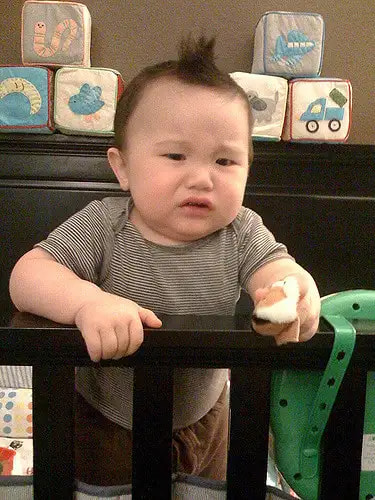- Home

- Constipation

- Constipation in babies: Symptoms and Cure
In this Article
Constipation
Constipation in babies: Symptoms and Cure
Updated on 16 March 2022
If your baby is straining to do a poo, it doesn't necessarily mean that she's constipated. Before long, you'll recognise your baby's particular grimaces and grunts as she works on her bowel movements. You’ll also become very familiar with what looks normal (or not) in your baby’s nappy.
How can I tell if my baby is constipated?
When it comes to a baby’s bowel movements, there is often no normal number or schedule. Similar to adults, babies’ bowel movement patterns vary. Poo can also change in texture from day to day.
If you’re concerned that your baby may be constipated, look out for these signs:
- Crying and discomfort, irritability or pain before doing a poo.
- Dry, hard, pellet-like poo that she has trouble passing.
- Fewer than three bowel movements a week.
- Foul-smelling wind and poo.
- Loss of appetite.
- A hard belly.
As odd as it sounds, very liquid poo can be also be sign of constipation. Liquid poo can slip past the blockage of hard poo in the lower intestine. If you see this, don't assume it's diarrhea. It may be evidence of constipation.
What causes constipation?
There are several possible reasons why your baby may be constipated:
- Formula milk. A formula-fed baby is more prone to constipation because formula can be harder to digest than breastmilk, causing poo to be firm and bulky. A breastfed baby is unlikely to get constipated. Breastmilk produces poo that is almost always soft, even if a baby hasn’t done a poo for a few days.
- Introducing solids. Babies often become constipated when they start solids, as their bodies learn how to manage new foods. Low-fibre foods and not enough fluids also contribute to constipation.
- Dehydration. Your baby may be refusing milk because she's teething, has thrush, a throat infection, a cold, or an ear infection. Or your older baby may not be drinking enough milk or water with her solid foods. Whatever the reason, if your baby isn’t getting enough fluids, she may become dehydrated. This can cause dry, hard poo that is difficult to pass.
- A medical condition or illness. Occasionally, constipation can be a symptom of a food allergy, food poisoning (such as botulism), or a problem with the way the body absorbs food, known as a metabolic disorder.
Very rarely, constipation in babies can be caused by congenital conditions. These can include a disease where the large intestine doesn’t function properly (Hirschsprung's disease), a condition where the anus and rectum have not formed properly (anorectal malformation), spina bifida and cystic fibrosis.
How can I treat constipation?
Check with your doctor or health visitor before trying anything to ease your baby's discomfort. You may be asked to bring her in to be examined. Here are some home treatments that your doctor may suggest:
- Gently move your baby’s legs in a bicycling motion to help move the hard poo along her intestine.
- If your baby is drinking formula, give her extra water in between feeds, but don’t dilute the formula. Make sure that you are using the recommended amount of milk powder when making up a bottle. Too much powder can dehydrate your baby, causing constipation. Your doctor may also recommend trying a different brand.
- If your baby has started olids
- , give her plenty of water or diluted fruit juice. Plenty of fibre in your older baby’s diet could also help. Pureed or chopped apples, apricots, blueberries, grapes, pears, plums, prunes, raspberries and strawberries are all high in fibre. You could also add a small amount of high-fibre cereal to your baby’s usual breakfast cereal.
If these home treatments have not worked, or if your baby’s constipation is severe, your doctor may suggest a laxative, such as macrogol or lactulose.
Try not to worry too much if your baby becomes constipated. It's likely to happen now and then, especially if she is formula-fed or eating solids. With your attention, necessary treatment, and time, she'll soon establish easier, regular bowel movements again.



Written by
Ravish Goyal
Official account of Mylo Editor
Read MoreGet baby's diet chart, and growth tips

Related Articles
Related Questions
Hello frnds..still no pain...doctor said head fix nhi hua hai..bt vagina me pain hai aur back pain bhi... anyone having same issues??

Kon kon c chije aisi hai jo pregnancy mei gas acidity jalan karti hain... Koi btayega plz bcz mujhe aksar khane ke baad hi samagh aata hai ki is chij se gas acidity jalan ho gyi hai. Please share your knowledge

I am 13 week pregnancy. Anyone having Storione-xt tablet. It better to have morning or night ???

Hlo to be moms....i hv a query...in my 9.5 wk i feel body joint pain like in ankle, knee, wrist, shoulder, toes....pain intensity is high...i cnt sleep....what should i do pls help....cn i cosult my doc.

Influenza and boostrix injection kisiko laga hai kya 8 month pregnancy me and q lagta hai ye plz reply me

Related Topics
RECENTLY PUBLISHED ARTICLES
our most recent articles
Childproofing
Childproofing checklist: Before your baby crawls

Pregnancy
Home essential medical kit for Corona.
Best Sleeping Positions
How to have a safe sleep during your pregnancy and what are the best sleeping positions?

Role Of A Father
Being a new dad how can I comfort my newborn baby in the middle of the night?

Baby Care
Numerous reasons for having 1 in million life partner
Baby Massage
Massaging your baby is not the best idea according to doctors
- jyadatar babys ko hone vali problems ka solutions
- Sharing responsibilities with your partner
- Ovulation- Few easy ways to detect your most fertile time
- Major Milestones and Tips to manage your 8-month-old baby
- 7 Advantages of Being a New Mom
- Are you wondering when can you start feeding finger foods to your baby? Here's a complete guide.
- Learn all the important do’s and don’ts of hosting a baby shower.
- Make an interesting diet chart for your 11-months-old baby
- Know more about Infant developmental milestones for 7-12 months old.
- Water breaking: What it feels like.
- Golden tips of Ayurveda for pregnant women to keep the spirits high
- What is Preeclampsia?
- Know all about Annaprasan ceremony of your baby and how to celebrate it.
- Top 5 Things to Help you get Pregnant


AWARDS AND RECOGNITION
Mylo wins Forbes D2C Disruptor award
Mylo wins The Economic Times Promising Brands 2022
AS SEEN IN
















At Mylo, we help young parents raise happy and healthy families with our innovative new-age solutions:
- Mylo Care: Effective and science-backed personal care and wellness solutions for a joyful you.
- Mylo Baby: Science-backed, gentle and effective personal care & hygiene range for your little one.
- Mylo Community: Trusted and empathetic community of 10mn+ parents and experts.
Product Categories
baby carrier | baby soap | baby wipes | stretch marks cream | baby cream | baby shampoo | baby massage oil | baby hair oil | stretch marks oil | baby body wash | baby powder | baby lotion | diaper rash cream | newborn diapers | teether | baby kajal | baby diapers | cloth diapers |





